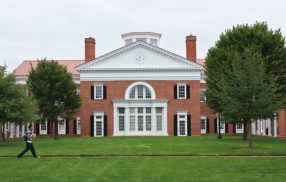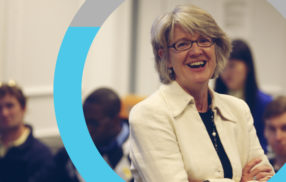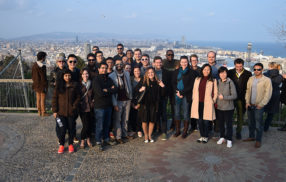
Design Thinking Powers Ideas to Improve Vulnerable DC Citizens’ Financial Health
By Madison Masloff
University of Virginia Darden School of Business Professor Jeanne Liedtka’s courses on design thinking have influenced hundreds of thousands of Darden MBA students, Darden Executive Education participants and online learners. The impact of her teaching once again reached far beyond the classroom this summer, helping a group of Washington, D.C., area professionals find solutions to improve the financial health of vulnerable citizens, thanks to Design Thinking DC‘s (DT:DC) Summer of Design program.
Summer of Design is an immersive learning experience that employs Darden Executive Education’s online design thinking curriculum, led by Liedtka. Through the program, local business professionals who are members of DT:DC are placed in small teams that seek creative and innovative ways to solve various local social issues.
This summer, Summer of Design teams sought answers to the question: How might we improve the financial health of vulnerable D.C. citizens through entrepreneurship and public-private partnerships? Solutions to the issue are critical for Washington, D.C., to address challenges affecting local populations of the homeless, elderly immigrants, students struggling with loan debt, single mothers and survivors of domestic violence. Capital One Bank reached out to Karen Hold, director of DT:DC and the Summer of Design program, with the issue and she gladly accepted the invitation to collaborate.
“I was raised in Washington, D.C., and I love my hometown. It’s very important to me to both give back to the community and empower other residents to problem solve for themselves without waiting for permission from government organizations,” said Hold.
Hold and other design thinkers believe design thinking is a useful tool for solving social issues because it provides a way for people to approach complex challenges that are not easily solvable.
Summer of Design program leaders seek diversity and are intentional when creating the teams, purposely pairing individuals from different industries in order to introduce diverse voices into the problem-solving process.
“When working with cross-disciplinary teams, everyone comes with their own areas of expertise and methods because they have developed particular ways of working within their own workplace,” said Hold. “Trying to work across those differences can be very challenging without a social technology such as design thinking to facilitate that conversation.”
Liedtka and Hold have been colleagues for many years. Hold chose to use Darden’s curriculum for Summer of Design primarily because of its business orientation. Darden’s curriculum was also appealing since it followed a similar framework to her design thinking vision.
After taking the helm of the Summer of Design in 2015, Hold responded to participants’ requests to receive credentials upon their completion of the program. Since Hold was already working with Liedtka and loved the Darden methodology, it made sense for her to incorporate Darden’s credentials into the program. Individuals who participate in the program now receive a statement of accomplishment from Darden and receive credit for one-half of Darden Executive Education’s specialization in design thinking and innovation, which they can later earn in full by taking additional online courses.
The program lasts for 12 weeks, when roughly 50 “Design Thinkers” who are all members of DT: DC split into groups, research and workshop, build prototypes, receive feedback and ultimately pitch their final solutions to a panel of judges. Pitch night consists of each team making a presentation outlining their business model, assumptions of their idea and the most important next steps to take.
This year’s panel of judges consisted of eight people including; Ernest Clover, director of DC Dream Center; Eric Falquero, editor-in-chief of Street Sense; Jayme Johnson, director of strategic initiatives for the Washington Metropolitan Area Transit Authority; and Aram Ter-Minassian, head of consumer payment products at Capital One.
The idea that won the judges’ favor this summer, called Purse Strings, helps women who desire to get out of an abusive relationship.
Through research and interviews of domestic violence survivors, the Purse Strings team found that survivors oftentimes have to share their stories of abuse repeatedly just to put protection in place. And each time survivors retell their story, they’re traumatized again. Purse Strings prevents this “retraumatization” through creation of a digital key that captures survivors’ stories so they do not have to share their story more than once. Purse Strings also uses geolocation technology and analytics to supply survivors with a community of vetted resources such as other survivors, doctors and lawyers.
“I have a general consensus from my group, and we would all say the program was incredibly helpful,” said Sabrina Blowers, a consultant and member of the Purse Strings team. “The classes were very insightful and the speakers did a great job of explaining whatever the topic was that week. The program also provided a lot of useful templates and tools to guide our work.”
In addition to Blowers, the Purse Strings team included Taneka Caffee, Katharine Graham, Katie Hall, Betsy Kirkland and Niya Watkins.
Liedtka was the main content speaker for the program, primarily guiding the preclass videos that outlined various topics such as stakeholder interviews and prototyping.
“The program truly walked us through the design thinking journey from both the initial design challenge, how to come up with that, how to ideate and move through to the point of prototyping, and then getting it back in front of users,” said Blowers. “Even when we didn’t always agree, it didn’t seem to be a challenge. I don’t know if we ‘got lucky’ or if we just used the program and moved forward, but overall we are all just really grateful for the program.”
The University of Virginia Darden School of Business prepares responsible global leaders through unparalleled transformational learning experiences. Darden’s graduate degree programs (MBA, MSBA and Ph.D.) and Executive Education & Lifelong Learning programs offered by the Darden School Foundation set the stage for a lifetime of career advancement and impact. Darden’s top-ranked faculty, renowned for teaching excellence, inspires and shapes modern business leadership worldwide through research, thought leadership and business publishing. Darden has Grounds in Charlottesville, Virginia, and the Washington, D.C., area and a global community that includes 18,000 alumni in 90 countries. Darden was established in 1955 at the University of Virginia, a top public university founded by Thomas Jefferson in 1819 in Charlottesville, Virginia.
Press Contact
Molly Mitchell
Senior Associate Director, Editorial and Media Relations
Darden School of Business
University of Virginia
MitchellM@darden.virginia.edu







